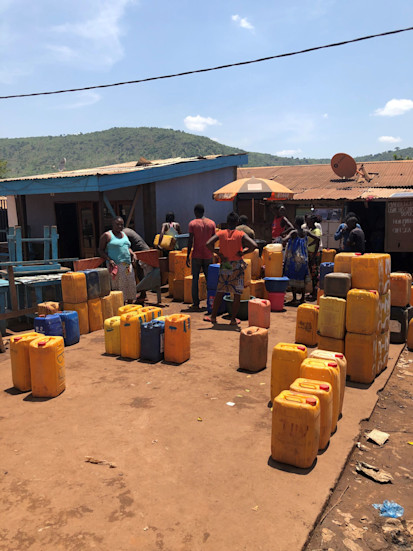
In search of a rare good
Midnight to 2 am or even 3 am are the off-peak hours when Plisson, a 30-year-old mother of three, often wakes up to fetch water, if there is any. "You can see me during the day all dressed up, but you'll have no idea what I go through at night", she says. This is what often happens in some neighbourhoods of Bangui, the capital of the Central African Republic (CAR), particularly in the fourth district where Plisson, her husband and their three children live. And when there is no water at all from their taps, the family has to pay 200 francs CFA (300 US cents) a day to draw 100 litres of water from private suppliers. Plisson’s family is among the 60 per cent of Central Africans who do not have access to water and adequate sanitation in 2022 according to the Humanitarian Needs Overview published in October 2021. CAR is located in the region with the highest per capita availability of water on the African continent, but only 37 per cent of the population has access to drinking water.
Growing needs
Alida, a 21-year-old mother of three living in Ouifrane village, 7 km from Ndélé in the north of the country, has no choice but to use water from an undeveloped spring for all her daily needs, including drinking and cooking, as she has no tap to draw from. "I know that the water from this spring is not safe to drink and that it can make me sick, but there are no alternatives near our village," says Alida. CAR has the second highest mortality rate from unsafe water use in Africa. Poor access to water, which has mainly structural causes, is exacerbated by the conflict that has been tearing the country apart for more than a decade and is all the more problematic during the dry season, which runs from November to May.
In 2021, water, hygiene and sanitation (WASH) needs increased by 13 per cent in CAR, with an additional 300,000 people requiring assistance to access safe drinking water and sanitation facilities. In total, more than half of the population (2.8 million people) need WASH assistance. People like Alida who live in the Ndélé Sub-prefecture in the north have the most severe needs in the country. This deterioration is due to, among others, the abandonment of water points that are no longer maintained when people flee from insecurity, and the contamination of wells. Added to this is the loss of water collection and storage containers during people’s displacement and vandalism by armed elements when they attack villages.
A source of life
Wearing a khaki waistcoat with the organisation's red logo, it is hard to miss Médard as he passes through the streets of Adoumindou, a village in the north of the country in the Bamingui-Bangoran Prefecture. Médard is a WASH facilitator who educates people on best practices, including the treatment, handling and hygienic storage of drinking water, handwashing with soap and access to clean and safe sanitation. "With my work in the community, I help people to avoid diseases such as cholera and diarrhoea, which are a cause of death, especially for children," says Médard, who works with the NGO Première Urgence Internationale, proudly. In 2021, the NGO built eight wells in the Bamingui-Bangoran Prefecture, improving access to drinking water for 4,000 people. Thanks to the mobilisation of the humanitarian community, the sub-prefectures of Nangha-Boguila, Kémbé, Satema, Bangassou, Bira and Gambo have seen a significant reduction in WASH needs.
A long way to go
In 2021, humanitarians requested US$38 million to assist 1.4 million people but only received 25 per cent of this amount, which benefited 494,700 vulnerable people, or 35 per cent of the planned target. In 2022, humanitarian actors are seeking to mobilise US$34.5 million to improve access to WASH for 1.5 million people. During the first half of 2022, 4.1 million USD (12 per cent) were mobilized to assist 359,096 people.